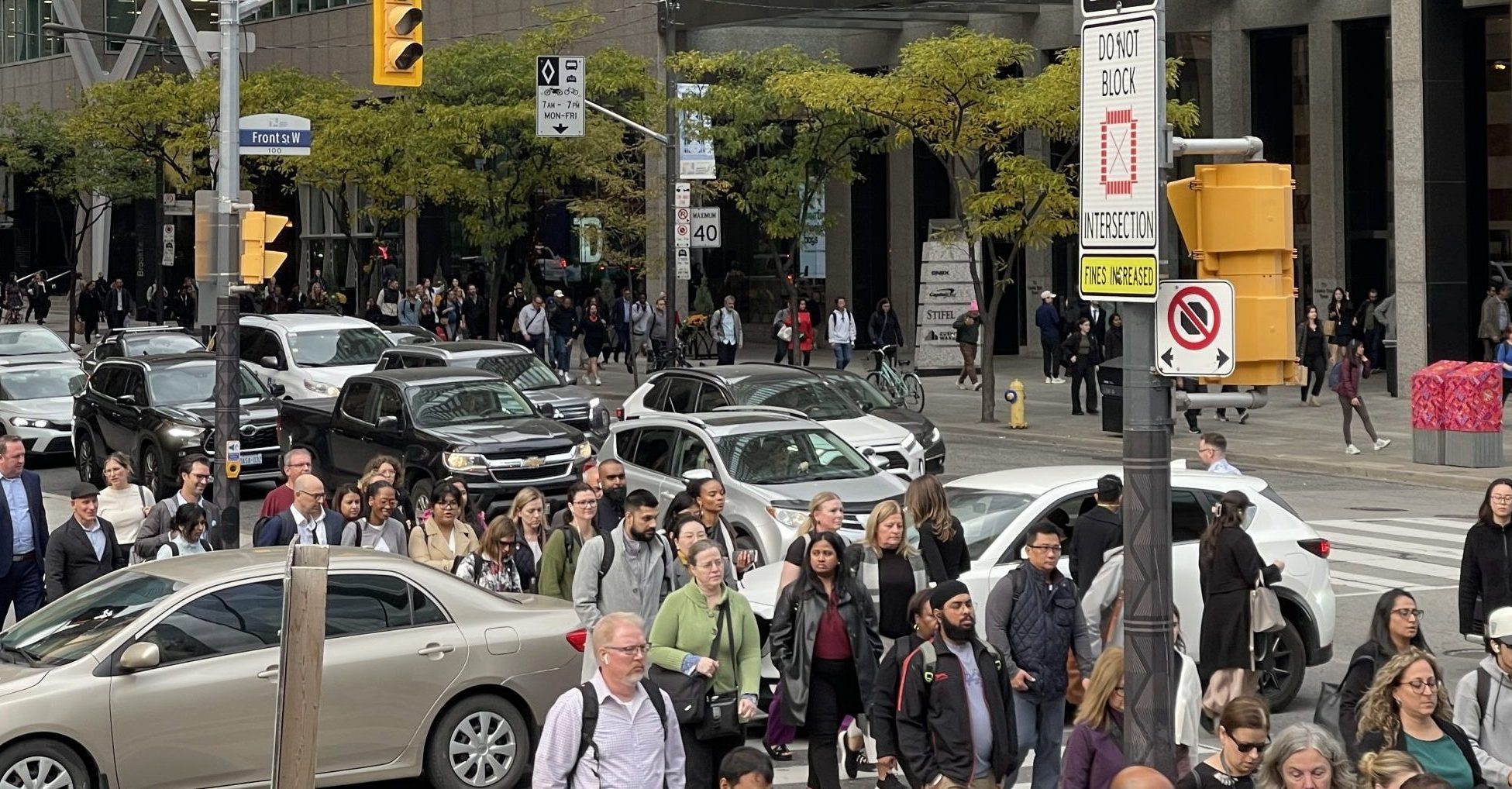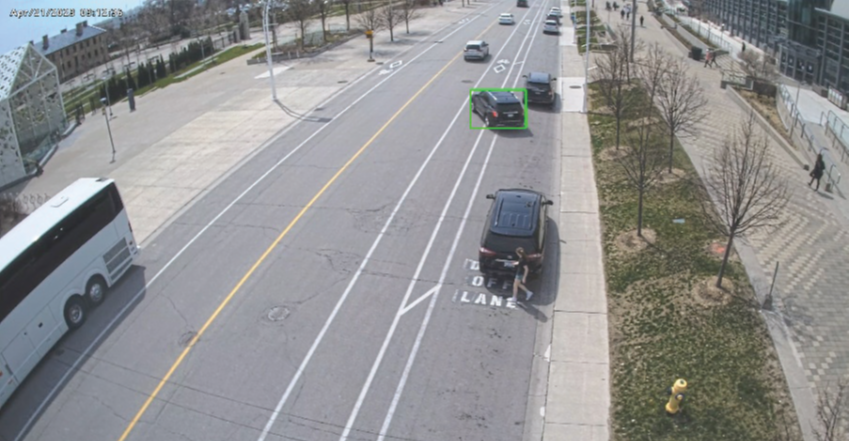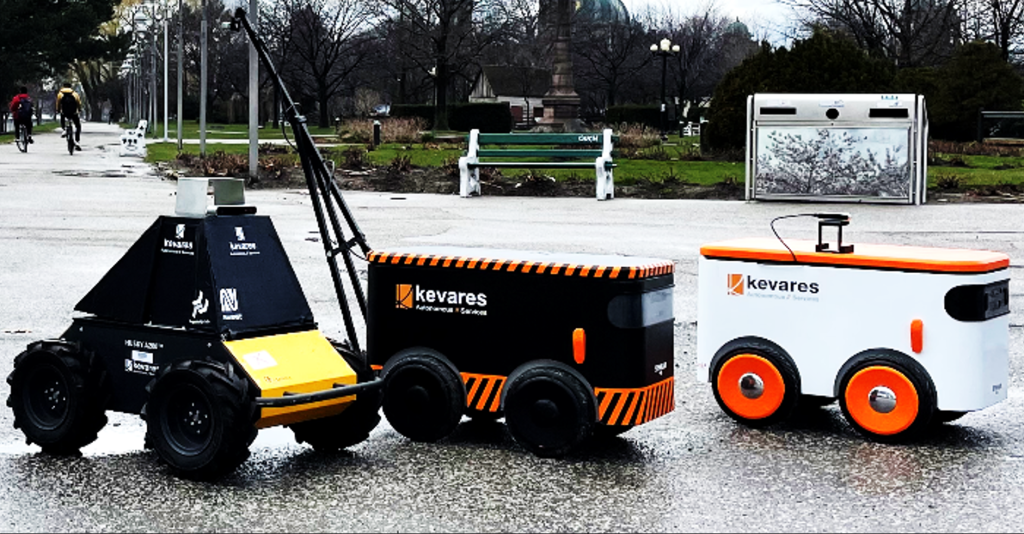



Urban mobility is rapidly evolving and the City of Toronto is continuously assessing new approaches and tools that can help its transportation system remain healthy, equitable and safe. Emerging technologies such as micromobility and electric, connected and/or automated vehicles are growing in popularity. Smarter traffic control systems, innovative paving materials, and automated transportation monitoring and enforcements methods, while less visible, are also emerging.
The Transportation Innovation Challenge (TIC) Program uses time-limited, real-world deployment “challenges” to help the City learn about emerging transportation technologies that may advance the City’s mobility-related goals such as Vision Zero, congestion management, improved accessibility, more efficient service delivery, and emissions reductions. When possible, it also supports local economic development. Innovators whose products or services relate to the identified TIC topic are invited to showcase it to City staff through facilitated deployments at relevant locations in Toronto. The specific length, format and participation requirements are customized depending on the TIC topic and identified learning objectives.
TICs are not connected to any City of Toronto procurements or indicative of future procurements.
Applications were received until 11:59pm ET on December 2, 2024 and the Call for Participation has closed.
Details of this Automated Enforcement TIC can be found in the official Call for Participation.
| Date | Notes |
|---|---|
| Monday, November 4 | Applications Open |
| Tuesday, November 19 from 12 p.m. to 1:30 p.m. ET | Virtual Information Session. TIC Virtual Information Session Presentation |
| Monday, December 2 at 11:59 p.m. ET | Applications Close |
The full report for Transportation Innovation Challenge (TIC) #3 is now available.
The purpose of the Parking Sensor and Curbside Vehicle Detection Challenge was to learn how vehicle detection technologies used in a parking context could benefit the City of Toronto and the people who live, work, do business in, and visit the city. This TIC allowed City staff to learn about the current state of vehicle detection technology and participants to receive feedback about their systems. The findings from this TIC will provide input to the forthcoming city-wide Parking Strategy.
In October 2022, the following organizations responded to the open call to participate in the innovation challenge and were accepted into the program: Automotus, Electromega, eleven-x and Precise ParkLink.
The detection systems, which included both camera and in-ground sensor systems, were installed in January 2023. Data collection and observation ran until May 2023. This TIC focused on four learning themes:
More information about these themes and learning objectives can be found in Section 1.1 of the TIC report. A series of use cases for this technology were also identified, which anticipated how the systems could benefit both the public and the City. These use cases, detailed in Section 1.4 of the TIC report, are:
The City held its second Transportation Innovation Challenge in spring of 2022. The City launched this Challenge to better understand the operation, function, and role of Micro-Utility Devices in dense urban environments such as Toronto.
The core objective of the Transportation Innovation Challenge was to demonstrate whether and how micro-utility devices can overcome, improve, or address sidewalk challenges and navigate through competing uses in dense urban environments without posing safety risks to sidewalk users. New micro-utility devices are emerging that could address known challenges we face in Toronto. City staff wanted to:
Applicants were able to enter their technology through 4 categories:
The Transportation Innovation Challenge took place on the grounds of Exhibition Place. Each participant demonstrated their device in half day increments, outdoors, exposed to the typical weather conditions on Exhibition Place grounds throughout the month of April 2022.
The Call for Applications received six participants. The six applicants were technology companies local to the Toronto, Greater Toronto and Hamilton Area, and Canada. Some applicants also had operations internationally.
Trial participants were not compared against each other as each device was unique in the purpose, design, functionality, and level of technology readiness[1].
The Trials took place from April 4, 2022 until April 21, 2022, the following six applicants were successful and participated in the Trials:
The City issued the first Transportation Innovation Challenge in 2021 for organizations developing new technologies in automated sidewalk winter maintenance to clear snow or apply salt to sidewalks.
To inform the Automated Sidewalk Winter Maintenance Trial, CAVCOE (formerly The Canadian Automated Vehicles Centre of Excellence) conducted a market scan to determine the current state of automated sidewalk winter maintenance technology, the current research and development needs, and the applicability to winter maintenance challenges in the City of Toronto. The executive summary of this research report is available here.
Urban mobility is rapidly evolving, and the City of Toronto’s Transportation Services Division is continuously assessing new approaches and tools that can help its transportation system remain healthy, equitable and safe. Emerging technologies such as micromobility and electric, connected and/or automated vehicles are growing in popularity. Smarter traffic control systems, innovative paving materials, and advanced transportation monitoring methods, while less visible, are also emerging.
Transportation Innovation Zones (TIZs), also referred to as “living labs”, are areas where transportation and public realm innovations can be tested in a real-world setting. They offer a controlled testing ground where technologies emerging from academia and industry can be trialed, while monitoring and evaluating their performance. TIZs with various resources and configurations are becoming common around the world, variously operated by government, private, non-profit and academic organizations.
In 2020, the City of Toronto established a TIZ in partnership with Exhibition Place. The TIZ is used to learn about emerging innovations, and to explore their potential benefits, risks, applications, and impacts on factors such as safety, accessibility, and privacy.
Exhibition Place has a rich history of showcasing transportation technology, dating back to the first electric streetcar demonstration in 1884. Managed by a City-owned corporation, Exhibition Place is a 192 acre mixed-use district west of downtown on Toronto’s waterfront. It was chosen for the TIZ due to its central location and the presence of relevant infrastructure including roads, sidewalks, bike lanes, traffic signals, and bus stops. The area’s exemption from the provincial Highway Traffic Act (HTA) enables it to be used as a testing ground for technologies not covered in the HTA.
Exhibition Place’s new Master Plan outlines a vision for Exhibition Place as a place of innovation, inspiration and economic development, alongside other pillars in the plan.
In 2021, Council approved a challenge-based format for the TIZ with a focus on transportation solutions. The program aims to support research and development, grow local economic activity and talent, and advance the City’s mobility-related goals such as Vision Zero, accessibility, more efficient service delivery, and emissions reductions to meet TransformTO goals.
Each TIC is a time-limited trial focused on a specific theme, with defined learning objectives and parameters for how it will run. The TIC program is managed by Transportation Services, with themes and objectives selected collaboratively with Exhibition Place and other City divisions and agencies. An open call is made to solicit private-sector and academic participants to showcase their technologies related to the selected topic. During a TIC, each product is assessed by a committee of Challenge Advisors, representing City divisions and agencies with an interest in the TIC topic. Assessment criteria are based on the TIC’s learning objectives and the potential ways in which the technology might be used in Toronto (“uses cases”). Participants in TICs are not scored, ranked, or compared against one another.
The TIC program creates mutual learning opportunities. The City gains a better understanding of the current state of new transportation technologies and the opportunities they offer to resolve or mitigate current transportation challenges. Industry and academic participants benefit from experience deploying their technology in a real-world environment, and learning about the City’s policies, priorities, and perspectives in relation to the TIC topic. The TIC model is focused on learning and is detached from any procurement process or indication of future procurement.
Collaborating and co-producing knowledge with stakeholders and the public is at the core of the TIZs program.
In mid-September 2020, the City hosted four online workshops to gather feedback and recommendations from stakeholders on the proposed Transportation Innovation Framework.
The workshops had a total of 93 participants representing a wide range of organization types and interests and generated over 400 questions, suggestions and ideas. The majority of suggestions were prioritized by participants through collaborative idea rating.
Below are the reports summarizing the Stakeholder workshops:
All results were considered in details, with key suggestions directly influencing and reflect in the draft framework document.
The TIZ concept was first developed in 2018-2019 as part of the Automated Vehicles Tactical Plan, which included consultation with academic institutions, community stakeholders and non-profits, automotive and technology industry members and associations, international experts, and the public.
The specific proposal for a TIZ in Exhibition Place has been supported as part of Phase 1 of the Exhibition Place Master Plan (Next Place), which included public and stakeholder consultation.
The City has also received public input about the use of digital technology through the City’s Digital Infrastructure Plan.
In total, these consultation processes recorded the opinions of thousands of residents and hundreds of organizations, contributing to the core values, principles and general concept for the Transportation Innovation Framework.